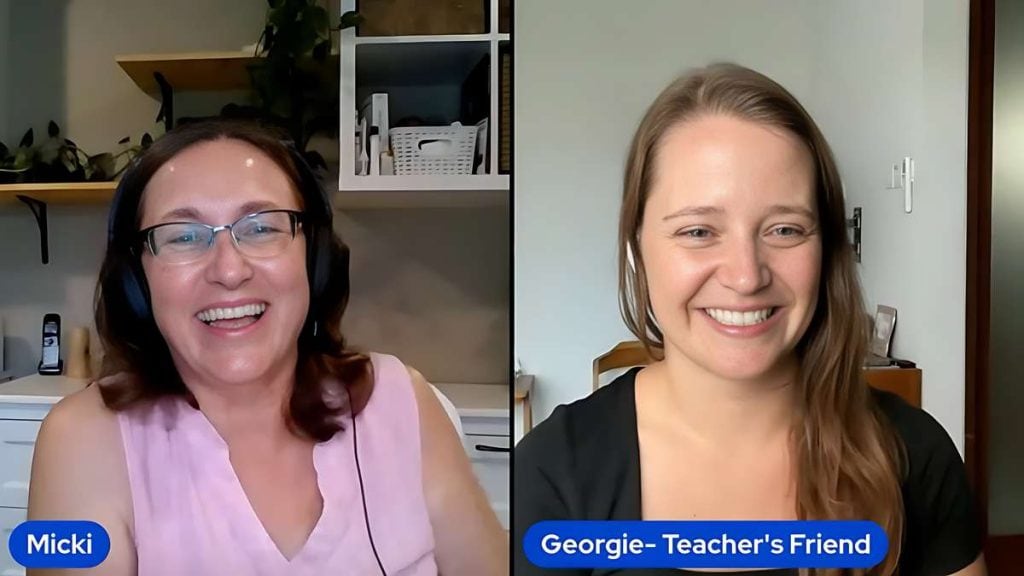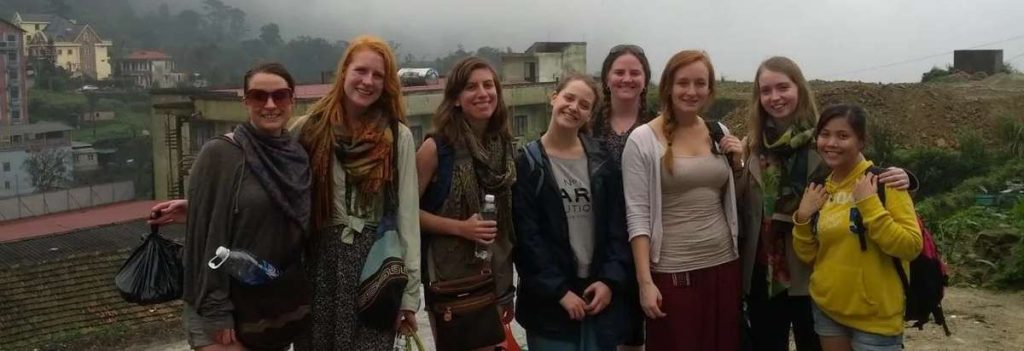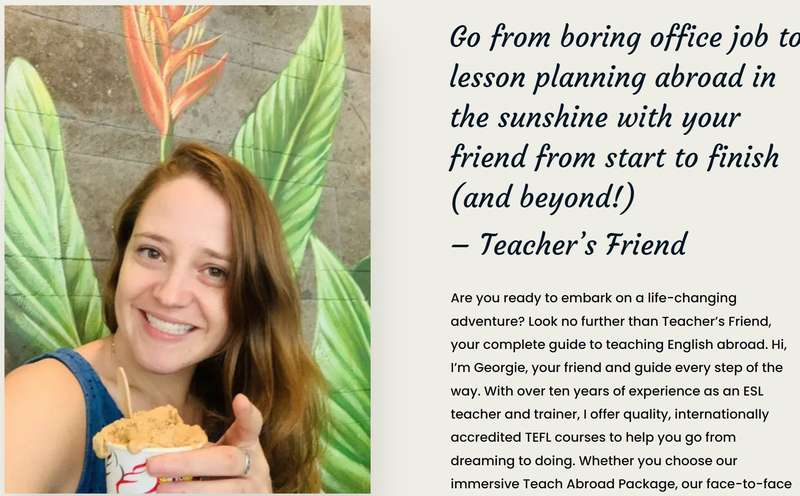Last updated:
From volunteering on a remote island to working on a yacht, there are so many cool ways to live and work abroad. Just picture yourself working as a guide in a far off destination, being an au pair jet setting around Europe, or teaching English in a country you only read about in books. Teaching abroad is not only a popular job for native speakers, but also the focus of this post.
We’ve traveled around the world for years as digital nomads. On our first round the world adventure together, Charles worked in Australia in a greenhouse, and I edited academic essays and worked remotely as a technical writer. Years later, we started this site, and made our living as travel bloggers but it was a lot of years in the making and a lot of short and long contract work in the middle.

We’ve gotten a lot of emails from you all over the years about how to get a job teaching English overseas, but while we’ve worked remotely, we’ve never taught abroad. So we brought in Georgie Snape of Teacher’s Friend, who’s an expert on teaching overseas. In our chat, she shares some incredibly helpful tips on everything you need to know, from how to get your first teaching job, to choosing a TEFL course, to the best countries for teaching overseas.
The YouTube video of our interview with Georgie is live! Make sure you’re subscribed to our channel, and have notifications turned on so you don’t miss our videos!
Micki: So, how did you get into teaching?
Georgie: I don’t actually remember this, but when I eventually went to teach, my friends were like, ‘Oh, you’ve been going on about this since you were 14.’ And I was like, ‘Oh, I have?’
So I think I wanted to learn to travel from a young age. I did a degree in community drama, so instead of being an actor on stage, I was running workshops within the community, helping marginalized groups. I naturally learned a lot of the skills I would need to be a teacher.
I knew teaching was a good way to travel, and I love teaching as well. I graduated and did my dissertation, which was project-based, at the same time as doing my TEFL course. In hindsight, that was a terrible idea, but it meant I was ready to go as soon as I finished my degree.
Micki: Where have you taught English?
I spent three months in Vietnam, traveling, and then I came back to teaching again in Vietnam.
Then I moved to Australia and New Zealand, which a lot of people don’t think of as destinations for teaching English abroad, but there are many local people who want to go to university abroad or move to an English-speaking country. So there’s actually a lot of teaching English in Australia and New Zealand as well.
I did that, then came back to Vietnam. Vietnam’s my baby. I taught in Vietnam and also in Thailand, Malaysia, Cambodia, and now I’m in Indonesia.
Well, my plan was to go teach for six months, and I’m still here 11 years later. So I’m not really sure what happened, but here I am.
Micki: What advice would you give to someone who’s interested in teaching abroad? How do you get started?
Georgie: Well, first you need to get qualified. You’d need a TEFL certificate. Choose a TEFL course that’s going to prepare you as best as possible.
I’ll keep it brief for now, but choosing the right TEFL course is definitely my first advice. When I was doing it, I asked myself what I wanted from teaching abroad. I came up with four criteria: to be well-paid, to have a lower cost of living because it makes it easier, to have friendly people, and to enjoy beautiful scenery. That sounds like a pretty good life.
I was a bit old school, so I bought the TEFL guide, which was an actual book, and I read through it. You can also do searches online and look at all the countries, weighing the pros and cons, and considering which countries offer the highest salaries.
After I did my TEFL, many TEFL providers helped with job assistance, but you can also pay for someone to help you with everything involved in moving abroad. It depends on what kind of person you are and whether you want someone to guide you through the process.
Micki: In terms of TEFL courses, are there any that you would recommend avoiding or ones that are better? Are online or in-person courses better?
Georgie: I always say to do an in-person TEFL, even if you’re already a teacher. Teaching English as a foreign language to non-native speakers is not the same as teaching English to people who speak English as their first language.

The biggest ‘oh my gosh‘ moment that students have is realizing they didn’t learn this in school because it’s a completely different way of thinking and learning. In-person courses give you access to the trainer and other people going through the same situation. These courses are often abroad, so you get to meet people and immerse yourself in the culture, plus you get real-time practice on your peers.
Most face-to-face courses include teaching practice, so you get to go into a classroom. It’s not the same when you do something with your peers who understand you versus real students who might struggle to understand you.
However, I understand that not everyone can afford a face-to-face TEFL. These courses are typically a month long, and you need money to sustain yourself. Face-to-face courses also cost more. If you’re close to having the budget, I’d say wait and save up. It’s definitely worth it. For those who can’t, your TEFL should be a minimum of 120 hours and include some kind of observed teaching practice. If not, you can do top-up courses abroad, which usually work out cheaper.
Look at who’s training you. Ideally, you want someone who has been teaching for a significant amount of time and has also trained teachers for a significant amount of time.
Accreditation is another factor. TEFL isn’t accredited like a degree, so many providers claim accreditation from various third parties. It’s important to choose a TEFL course that is at least accredited by someone, but be wary of super cheap courses.
If your TEFL costs less than $250, it’s probably not worth the paper it’s written on, and employers won’t accept it. Between $250 and $500 is more acceptable. I’ve taught on both government-accredited TEFLs that weren’t very good and non-accredited TEFLs that were excellent. So, focus more on the quality and price rather than the accreditation.
Micki: Is a university degree required to teach abroad?
Georgie For a lot of jobs, yes. But if you don’t have a degree, you can still teach abroad. It typically means you’re more limited to certain countries for working legally. However, especially in Southeast Asia, many people work cash in hand or under the table. So it’s definitely not a closed door.
Cambodia, Spain, and Costa Rica are three good countries if you don’t have a degree. Unfortunately, if you don’t have a degree and you’re a non-native speaker, it’s an extra barrier, but it doesn’t mean you can’t do it. There’s also the option to work for yourself, where it doesn’t matter whether you have a degree or not.
Micki: That’s interesting. I hadn’t heard of Costa Rica for teaching.
Georgie: Oh, yeah. It’s not so much on the map because the wages tend to be lower, but you can definitely live there. It’s beautiful, and for people on the opposite side of the world, it means you don’t have to go so far from home. There are a lot of jobs there, and you don’t need a degree.
Micki: How have things changed since the pandemic?
Georgie: There’s been a big rise in people getting TEFLs with only an online course. It’s a catch-22 because it’s easier now, but employers are starting to realize that online TEFLs don’t provide as much practical training. Online TEFLs make it easier to get a job, but employers still favor face-to-face courses.
There are a lot more online jobs available now, but also more people teaching online. If you don’t have a degree or you’re a non-native speaker, the jobs are there, but you have to dig deeper to find them. Sometimes it’s better to be in the country to find those jobs. The market is still growing, and many people are doing it every year. For example, in Bali, they’re short of teachers because there aren’t enough.
Micki: What countries are best for first time teachers?
Georgie: Southeast Asia, definitely. That’s where I started. These countries are very safe and tourist-friendly. Most cities have some English, so the language barrier isn’t as challenging as in places like the middle of China. Compared to Japan and South Korea, Southeast Asia is built on tourism. You’re a bit of a novelty, and people are friendly with foreigners. In Japan and South Korea, they’re more ‘take it or leave it’ about foreigners.
Southeast Asia is cheap to live in, and the wages are pretty good. I probably earn less than a lot of my friends, but I have more disposable income because the cost of living is so low. The cost of living in North America has gone through the roof lately, so it makes sense. In Australia, the US, and the UK, the cost of living is high. What I live off is like their monthly bills without actually eating anything.
Micki: What kind of obstacles do first-time teachers face?
Georgie: A big one is lesson planning. It takes time to get good at it. You either don’t plan and realize in the lesson that you should have, or you plan too much and it takes over your life. Learning to plan the right amount is key, but it gets easier with practice, like learning to drive a car.
Culturally, especially in Southeast Asia, most people don’t struggle much because it’s very foreigner-friendly. Having the right support network, whether from a TEFL provider, a teacher abroad program, or someone you know who has done it, helps a lot. Accepting that it will be different goes a long way. Remember why you left home and try not to idealize going back.
Classroom management is another challenge, especially with small children. Different levels bring different issues. A quality TEFL course will give you practice and teach you how to manage a classroom. Non-verbal communication is crucial; no one wants to be the teacher constantly yelling for attention. We cover this extensively in our courses.
Another challenge can be the food. It’s very different and can be an adjustment.
Micki: . Tell me a bit about Teacher’s Friend. What do you do?
Georgie: The two main things I do are helping people get a TEFL course, whether online or face-to-face, and choosing the best option for them based on budget, country, and personal circumstances. The second is assisting people after they’ve got their TEFL. Many people get their TEFL and wonder, ‘Now what?’ They don’t know where to begin looking for a job or how to know if it’s legitimate. They worry about moving to a new country and starting to live there.
The Teacher’s Friend program helps with everything: logistics, social and cultural adjustment, and academic support. As a teacher trainer, I help people pass the TEFL course, assist with assignments, and offer lesson planning support. This bridges the gap between finishing TEFL and the first months of teaching when they need extra support.
Micki: Once someone comes to you, gets their TEFL, and you’ve helped them get a position, is there support after that?
Georgie: Yes, I really focus on active support. I’m still in touch with teachers from five or six years ago. They still come back to me for help with getting jobs or general life advice. I try to become a friend, hence ‘Teacher’s Friend.’ I love meeting new people.
Specifically, there’s lesson planning support for two months after they’ve started teaching. I also offer help with career progression. If they want to move to another country, I assist them in relocating.
Micki: How do people get in touch with you or learn more about what you do? What’s the best way for them to do that?
Georgie: If you want to have a look around, you can visit my website at https://teachers-friend.com/.
Check out my story where you can read about how I ended up here. I came through a Teach Abroad program but felt they did the bare minimum after I paid them. I found my feet, but I wanted to do a better job, which is one of the reasons I started Teacher’s Friend.
On my website, you’ll find information about the TEFL courses I offer, details about full relocation, and the different countries available. I’m also adding a list of online options for people who want the cheaper version, though I recommend face-to-face courses if possible. I understand budgets vary.
I also offer lesson planning assistance. Even if you’ve already done your TEFL or moved abroad and are struggling, you can buy lesson planning assistance separately. If you need help finding a job and don’t want the full package, I’m adding options for that too. All this information will be under packages on my website.
You can also book a call with me. I won’t hard sell you or push you to move somewhere you don’t want to be. Just book a call if you want to find out more information.
You can learn more about Georgie Snape and Teacher’s Friend on her website. You can also find her on Instagram, Facebook, and TikTok.










